

|
 |
|
GNR Biography
|
 |
|

At a time when pop was dominated by dance music and pop-metal, Guns
N' Roses brought raw, ugly rock & roll crashing back into the charts. They were not nice boys; nice boys don't play rock
& roll. They were ugly, misogynist, and violent; they were also funny, vulnerable, and occasionally sensitive, as their
breakthrough hit, "Sweet Child O' Mine," showed. While Slash and Izzy Stradlin ferociously spit out dueling guitar riffs worthy
of Aerosmith or the Stones, Axl Rose screeched out his tales of sex, drugs, and apathy in the big city. Meanwhile, bassist
Duff McKagan and drummer Steven Adler were a limber rhythm section who kept the music loose and powerful. Guns N' Roses' music
was basic and gritty, with a solid hard, bluesy base; they were dark, sleazy, dirty, and honest -- everything that good hard
rock and heavy metal should be. There was something refreshing about a band who could provoke everything from devotion to
hatred, especially since both sides were equally right. There hadn't been a hard rock band this raw or talented in years,
and they were given added weight by Axl Rose's primal rage, the sound of confused, frustrated white trash vying for his piece
of the pie. As the '80s became the '90s, there simply wasn't a more interesting band around, but owing to intra-band friction
and the emergence of alternative rock, Rose's supporting cast gradually disintegrated, as he spent several years in seclusion.
Guns N' Roses released their first EP in 1986, which led to a contract
with Geffen; the following year, the band released their debut album, Appetite for Destruction. They started to build a following
with their numerous live shows, but the album didn't start selling until almost a year later, when MTV started playing "Sweet
Child o' Mine." Soon, both the album and single shot to number one, and Guns N' Roses became one of the biggest bands in the
world. Their debut single, "Welcome to the Jungle," was re-released and shot into the Top Ten, and "Paradise City" followed
in its footsteps. By the end of 1988, they released G N' R Lies, which paired four new, acoustic-based songs (including the
Top Five hit "Patience") with their first EP. G N' R Lies' inflammatory closer, "One in a Million," sparked intense controversy,
as Axl Rose slipped into misogyny, bigotry, and pure violence; essentially, he somehow managed to distill every form of prejudice
and hatred into one five-minute tune.
Guns N' Roses began work on the long-awaited follow-up to Appetite
for Destruction at the end of 1990. In October of that year, the band fired Adler, claiming that his drug dependency caused
him to play poorly; he was replaced by Matt Sorum from the Cult. During recording, the band added Dizzy Reed on keyboards.
By the time the sessions were finished, the new album had become two new albums. After being delayed for nearly a year, the
albums Use Your Illusion I and Use Your Illusion II were released in September 1991. Messy but fascinating, the albums showcased
a more ambitious band; while there were still a fair number of full-throttle guitar rockers, there were stabs at Elton John-style
balladry, acoustic blues, horn sections, female backup singers, ten-minute art rock epics with several different sections,
and a good number of introspective, soul-searching lyrics. In short, they were now making art; amazingly, they were successful
at it. The albums sold very well initially, but while they had seemed destined to set the pace for the decade to come, that
turned out not to be the case at all.
Nirvana's Nevermind hit number one in early 1992, suddenly making
Guns N' Roses -- with all of their pretensions, impressionistic videos, models, and rock star excesses -- seem very uncool.
Rose handled the change by becoming a dictator, or at least a petty tyrant; his in-concert temper tantrums became legendary,
even going so far as to incite a riot in Montreal. Stradlin left by the end of 1991, and with his departure the band lost
their best songwriter; he was replaced by ex-Kill for Thrills guitarist Gilby Clarke. The band didn't fully grasp the shift
in hard rock until 1993, when they released an album of punk covers, The Spaghetti Incident?; it received some good reviews,
but the band failed to capture the reckless spirit of not only the original versions, but their own Appetite for Destruction.
By the middle of 1994, there were rumors flying that the band was about to break up, since Rose wanted to pursue a new, more
industrial direction and Slash wanted to stick with their blues-inflected hard rock. The band remained in limbo for several
more years, and Slash resurfaced in 1995 with the side project Slash's Snakepit and an LP, It's Five O'Clock Somewhere.
Rose remained out of the spotlight, becoming a virtual recluse and
doing nothing but tinkering in the studio; he also recruited various musicians -- including Dave Navarro, Tommy Stinson, and
ex-Nine Inch Nails guitarist Robin Finck -- for informal jam sessions. Remaining members were infuriated by Rose's inclusion
of childhood friend Paul Huge in the new sessions when both Stradlin and Clarke were excluded from rejoining the band. And
a remake of the Rolling Stones' "Sympathy for the Devil" was essentially the straw that broke the camel's back, as Rose cut
out some of the other member's contributions and pasted Huge over the song without consulting anyone else. By 1996 Slash was
officially out of Guns N' Roses, leaving Rose the lone remaining survivor from the group's heyday; rumors continued to swirl,
and still no new material was forthcoming, though Rose did re-record Appetite for Destruction with a new lineup for rehearsal
purposes. The first new original G N' R song in eight years, the industrial metal sludge of "Oh My God" finally appeared on
the soundtrack to the 1999 Arnold Schwarzenegger film End of Days. Soon after, Geffen issued the two-disc Live Era 1987-1993.
2000 brought the addition of guitarists Robin Finck (of Nine Inch
Nails) and Buckethead. 2001 was greeted with Guns N' Roses' first live dates in nearly seven years, as the band (who consisted
of Rose plus guitarists Finck, Buckethead, bassist Stinson, former Primus drummer Brian Mantia, childhood friend and guitarist
Paul Huge, and longtime G N' R keyboardist Dizzy Reed) played a show on New Years Eve 2000 in Las Vegas, playing as well at
the mammoth Rock in Rio festival the following month. A new album was announced for a summer release, but the date came and
went without any CDs hitting the shelves. A summer tour of Europe was planned, but before tickets could go on sale Rose announced
that the tour was cancelled and the band went into seclusion until New Years Eve of 2001. They played almost the exact same
set as the year before, but they still managed to brew up some news by not allowing any former members to watch the show.
Slash tried to get onto the guest list, and even claims to have tried to sneak in through a security guard. Manager Doug Goldstein
released a statement taking full responsibility for the banning of former members, claiming that he was not sure of their
intentions and he wanted to avoid making Rose nervous.
2002 started with no new Axl news, instead seeing former members Slash,
Duff, and Izzy work together on new material for Stradlin's new album. Rose eventually ended up in music news as he fired
producer Roy Thomas Baker from the group's newest recording sessions, adding him to the superstar list of producers that had
been attached to the project at various points (including Moby, Mike Clink, Youth, Bob Ezrin, and many others.) Slash's contributions
to Izzy's album didn't make the final cut, but rumors of a new band featuring former members McKagan, Sorum, and Slash began
circulating by the end of the spring. A slew of Japanese and British festival dates were set in the spring, but the mysterious
new album continued to elude fans as the release date was pushed into the fall of 2002. Before those concert dates rolled
around, guitarist Paul Huge left the group, quickly replaced by former Love Spit Love member Richard Fortus.
An appearance at MTV's annual Video Music Awards helped garner interest
in the new lineup, but a rusty performance from Rose and an interview where he said his new album wasn't coming out anytime
soon didn't do much to further their cause. That summer, the band started on their first tour in almost eight years, and they
managed to fulfill all of their commitments in Europe in Asia. Sadly, they caused a violent and destructive riot in Vancouver
when Rose failed to show up for the first date of their North American tour. While he was up to his old shenanigans with the
retooled lineup, former members Stradlin, Slash, Sorum and McKagan finally put an end to the rumors and announced that they
were searching for a vocalist for a new, Axl-free band. Over time, Stradlin would reduce his role in the new project to guest
songwriting and the occasional live appearance, but with former Stone Temple Pilots vocalist Scott Weiland, Slash, Sorum and
McKagan formed the successful Velvet Revolver in spring of 2002.
The years between Guns N' Roses albums have grown into a running joke
in the music industry, Interscope's frustration with the millions dumped into the recording has become secondary to Rose's
reclusive insistence to perfect his material. By leaving the industry on such a strong note, Rose's image has been frozen
in time as the frustrating, angry, yet sensitive genius behind the microphone, an image he might not be ready to live up to
as the years go by. Despite what happens to most groups that have stayed out of the limelight for ten years, the legend of
Guns N' Roses continues to grow with each year. Whatever may happen with the new lineup, the five original members continue
to enjoy celebrity status despite having their post-GN'R material show less than enthusiastic sales. By writing one of the
most critical hard rock albums of all time, they have secured their status as the most vital force to hit the mainstream rock
scene in the 80's.
|
 |
|
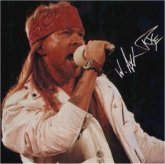
Depending who you ask, Guns N' Roses vocalist
Axl Rose is either considered a rock music icon who is worshipped by millions as an almost Christ-like figure, or hated as
a homophobic, misogynistic, and woefully self-indulgent "rock star" (in his defense, Rose has denied that he's a homophobe
or a misogynist numerous times over the years), as well as thought of as a tyrant by his ex-bandmates. William Bruce Rose
was born on February 6, 1962, in Lafayette, IN, and suffered sexual abuse
from his biological father and physical abuse from his eventual stepfather at an early age (Rose changed his name to William
Bailey after his mother remarried). Rose was also an outcast in school, where he was picked on for being "different," but
found solace in singing with his school and church vocal choir and eventually rock music. His rough teenage years were eased
a bit when he befriended a Keith Richards-worshipping chap by the name of Jeff Isbell, who shared Rose's interest in music.
Isbell left Indiana for the streets of Los Angeles in the early '80s with hopes of forming a rock band, and Rose followed
shortly thereafter, changing his name to W. Axl Rose (while Isbell soon adopted the name Izzy Stradlin).
The L.A.
rock music scene at the time was split done the center between rough and ready punk rock and hair spray-soaked glam rock/heavy
metal, and Rose wanted to form an outfit that borrowed equally from each genre. Stradlin and Rose plowed through several outfits
that went nowhere (Hollywood Rose being one), before hooking
up with fellow streetwise rockers Slash (guitar, real name Saul Hudson), Duff McKagan (bass), and Steven Adler (drums). After
slugging it out on the Sunset Strip and honing their act, the newly christened Guns N' Roses signed a recording contract with
Geffen Records after issuing an independent live EP (1986's Live Like a Suicide). Their full-length debut, Appetite for Destruction'
was released a year later and at first the public didn't know what to make of the album or of the band. Slowly but surely,
rock's fickle audience came around and by the summer of 1988, Guns N' Roses was fast becoming one of the world's top rock
bands (on the strength of such hit singles/MTV-saturated videos as "Welcome to the Jungle," "Sweet Child O' Mine," and "Paradise
City").
But with fame came death-defying drug and alcohol
abuse amongst all five bandmembers (as well as last-minute tour/concert cancellations) — it appeared as though the more
successful they became, the more problems arose. To fill the void for a new G N' R album, Geffen put out the 8-track stop-gap
EP, G N' R Lies, in late 1988, amidst widespread rumors of an impending band breakup. The album was another big seller (on
the strength of the hit acoustic ballad "Patience") but Axl Rose came under immense fire and criticism for the song "One in
a Million," in which Rose had derogatory comments for gays, blacks, and immigrants. Undeterred, Rose and co. regrouped and
worked on their much-anticipated true follow-up to Appetite, which seemed to always miss its numerous projected release dates.
Adler was sacked during the recording, while 1991 finally saw the release of the two-part sophomore effort Use Your Illusion.
Both discs were massive hits, but the band appeared to have reinvented themselves as a bombastic and indulgent rock act, often
recalling the music that their punk rock idols attempted to destroy in the mid-'70s. A mammoth two-year tour followed (with
Stradlin leaving the band mid-tour) in which G N' R found themselves losing their validity as a streetwise rock act in the
face of the stripped down grunge movement (which included such acts as Nirvana, Pearl Jam,
Soundgarden,etc.).
It only made Rose seem more out of touch from
reality when he would hold the band up from going onstage, resulting in ridiculous multi-hour delays. His public image took
a few more shots when several concerts were marred by audience riots caused by Rose's notorious hijinks and when he tried
to pick a fight with Nirvana leader Kurt Cobain backstage at the 1992 MTV Video Music Awards for disparaging (yet quite on
the mark) remarks Cobain made about Rose in the press. When the tour finally ground to a halt in 1993, G N' R issued a lukewarm-received
collection of covers, The Spaghetti Incident, and took a well-deserved rest. But after numerous aborted writing/recording
sessions for their third proper studio album, the remaining other two original members (Slash and McKagan) either quit the
band or were dismissed by Rose. Rose had been granted full ownership of the name Guns N' Roses, so he slowly formed a whole
new band around him.
With rumors running rampant that he had become a bloated, bald, and drug-addled hermit (due
to the fact that he did not grant a single interview between 1994-1999, staying completely out of the spotlight), Axl Rose
continued to work on G N' R's next release himself. 1999 saw G N' R's first new song released in nearly eight years —
the industrial rocker "Oh My God" from the End of Days soundtrack, as well as a live compilation of old-school G N' R tracks
(Live Era: '87-'93), yet both came and went without much fanfare. But all that changed when Rose and his new cohorts (which
included ex-Nine Inch Nails guitarist Robin Finck, mask-wearing solo guitarist Buckethead, ex-Replacements bassist Tommy Stinson,
ex-Primus drummer Brian Mantia, plus longtime G N' R keyboardist Dizzy Reed) played their first live shows together in early
2001, receiving unanimously favorable reviews. With a world tour booked and album nearing completion (reportedly to be titled
Chinese Democracy), the G N' R/Axl Rose-hype machine appeared to be building up to a feverish pitch once
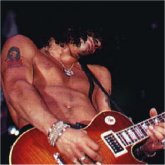
As the lead guitarist for Guns N' Roses, Slash established himself as one of hard rock's finest and
most soulful soloists during the late '80s, technically adept yet always firmly grounded in the gritty Aerosmith and Stones'
licks he loved. Slash was born Saul Hudson on July 23, 1965 in Stoke-on-Trent, England, to artistic parents both involved
in the entertainment industry; his mother was a clothing designer who worked on David Bowie's film The Man Who Fell to Earth,
and his father designed album art for such artists as Neil Young and Joni Mitchell. The family eventually moved to Hollywood, where Hudson attended junior high, received his first guitar, and met future
GN'R drummer Steven Adler. With Hudson adopting the nickname Slash, given to him by a family friend, the two formed a band
called Road Crew; although it proved unsuccessful, it was the vehicle through which they met and eventually joined up with
the other members of Guns N' Roses. The Gunners debuted in June 1985, and even before Appetite for Destruction was released
in 1987, the band acquired a reputation as notorious alcohol and drug abusers. As their popularity soared, the reserved Slash
established himself as an important part of the band's visual image, with a top hat and a mound of shaggy black hair covering
his face as he typically staggered around the stage with a cigarette dangling from his mouth.
Hedonistic excess consumed
most of the band, with such incidents as Slash and Duff McKagan's drunken, profane acceptance of the band's American Music
Award on live television. In 1990, opening for the Rolling Stones, Axl Rose's infamous on-stage pronouncement that he would
leave the band if certain members did not stop "dancing with Mr. Brownstone" (using heroin) was primarily directed at Slash
and Adler; Slash kicked his habit within a year, but Adler did not and was fired. In 1992, Slash courted controversy again
with a product endorsement for Black Death vodka. Later that year, he was married to actress and model Renee Sorum, a union
that lasted five years.
Meanwhile, in spite of controversy and personnel turnovers, Guns N' Roses had actually continued
to record music. After the Use Your Illusion sets of 1991, and the 1993 punk covers album The Spaghetti Incident?, the band
went on hiatus. Slash formed a side project called Slash's Snakepit, which consisted of fellow Gunners Matt Sorum (drums)
and Gilby Clarke (guitar), plus bassist Mike Inez and vocalist Eric Dover. The group released an album in 1995 titled It's
Five O'Clock Somewhere; Slash hit the road with a slightly different touring lineup, with Brian Tichy and James LoMenzo signing
on as the rhythm section. In 1996, Slash put together a different band to play at a blues festival in Budapest, an endeavor that evolved into Slash's Blues Ball. Featuring vocalist/harmonica
player Teddy Andreadis, rhythm guitarist Bobby Schneck, saxophonist Dave McClarem, bassist Johnny Griparic, and drummer Alvino
Bennet, Slash's Blues Ball devoted themselves primarily to a repertoire of classic blues covers, plus occasional GN'R and
Snakepit material. Rumors about the status of Guns N' Roses had been swirling for some time, and in October 1996 it was confirmed
that, owing to his unwillingness to follow Axl Rose's interest in industrial and electronic music, Slash was no longer a member
of the band (although he left the door open for a reunion if Rose decided to return to guitar-based rock & roll). He gigged
off and on with the Blues Ball into 1998, although a rumored live album never materialized. Instead, Slash decided to re-form
the Snakepit in 1999 with an entirely different lineup (the original members were by this time involved in other projects,
and the Blues Ball was more suited to touring than developing original material). Raspy-voiced singer Rod Jackson and ex-Venice
drummer Matt Laug came on board, along with Blues Ball bassist Griparic (now Johnny Blackout) and Teddy Andreadis, who contributed
keyboard and harmonica work. After trying out ex-Alice Cooper guitarist Ryan Roxie, Slash settled on rhythm guitarist Kerry
Kelly, who had previously worked with Warrant and Ratt. The new Snakepit played some gigs together and in the spring of 2000
completed a new album, which was originally slated to be released on Interscope/Geffen. However, feeling that a more traditional
guitar rock album would get lost in the promotional shuffle, Slash moved over to Koch, which finally released Ain't Life Grand
in October 2000.He now has a band called Velvet Revolver with ex-members of Guns N’ Roses (Duff McKagan,Matt Sorum)
and with ex-member of The Stone Temple Pilots (Scott Weiland).In june 2004 the released their first LP Contraband wiched sold
3 million copies in the US.Now they are on a tour.
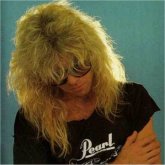
Original Guns N' Roses drummer, Steven Adler,
has the dubious distinction of being the first member of the band to have been fired by singer/leader Axl Rose (touching off
a trend that would continue until Rose was the only remaining original member left in attendance by the late '90s). Born January
22, 1965, in Cleveland, OH, Adler was entirely self-taught on the instrument,
inspired by such '70s hard rockers as Kiss and Aerosmith. After relocating to the Los
Angeles area, Adler befriended a fellow musician, Saul Hudson, who would eventually adopt the nickname
Slash -- as the duo formed a musical bond and played together in an outfit called Road Crew (named after a Motörhead song).
By the mid-'80s, Roadcrew had split up, while Adler and Slash had joined forces with other members of the Sunset Strip metal/glam/punk
scene -- Rose, bassist Duff McKagan, and rhythm guitarist Izzy Stradlin, to form Guns N' Roses. The story of G N' R is a well-known
one, as the quintet issued one of the best-selling rock debuts of all-time, 1987's Appetite for Destruction, whose raw, stripped
down approach (both musically and visually) was a welcome break from the overwrought glam pop bands that were ruling the airwaves
at the time.
But with success, came increasing internal difficulties within the band, as most of its members became
addicted to hard drugs and seemed hell-bent on imploding before they could offer a sophomore effort (in addition, Adler had
to sit out a spell of the album's tour when he broke his arm during a spat with a bouncer at a club). G N' R offered a stopgap
mini album, 1989's Lies, to temporarily satisfy their fans, but sessions for a proper follow-up seemed to drag on for an eternity.
In 1990, Adler was fired from the group (replaced by former Cult drummer Matt Sorum), and slid even deeper into drug abuse,
resulting in such health problems as a heart attack and a pair of strokes. Adler has made several attempts at re-entering
the rock world since his exit from G N' R, with such obscure outfits as Freaks in the Room and a new version of Road Crew,
as well as a brief spell as the drummer for '80s Van Halen-disciples the Bulletboys. Adler's biggest publicity during the
'90s wasn't musically based, however -- as he successfully sued G N' R for "wrongful termination," as well as doing jail time
for assaulting two women (in separate cases). By the early 21st century, Adler was supposedly at work on a book detailing
his tenure with Guns N' Roses (with a working title of No Bed of Roses), playing shows with different L.A. bands, and trying
to get the ball rolling for a reunion of the original Guns lineup.
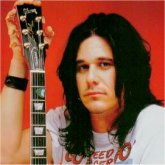
Although he's issued several
solo albums on his own, guitarist Gilby Clarke is best-known for his brief stint as a member of Guns N' Roses. Born on August
17, 1962, in Cleveland, OH, Clarke later relocated to Los Angeles, where he fell into the local music scene playing with such
obscure '80s outfits as Candy (who issued a lone album, Whatever Happened to Fun?) and Kill for Thrills (who too, only managed
a single release, Dynamite From Nightmareland). During this time, Clarke befriended the members of Guns N' Roses, who had
endured a meteoric (yet rocky) rise to superstardom. Shortly after a mammoth tour in support of their overblown Use Your Illusion
albums got underway in late 1991, founding guitarist Izzy Stradlin abruptly left the group. Clarke was one of the few guitarists
that G N' R tried out, and was quickly invited onboard. Clarke remained with the group for the remainder of the tour (which
lasted through 1993), and appeared on their all-covers release, The Spaghetti Incident.
But after coming off the road,
Guns singer Axl Rose decided to try pursuing different styles of music, which he thought Clarke's rough and ready style wasn't
suitable for, leading to Clarke's (and soonafter, the rest of the other members') dismissal from the band. Undeterred, Clarke
automatically launched a solo career, releasing such albums as 1994's Pawnshop Guitars (which spawned the moderate rock radio
hit, "Cure
Me...Or Kill Me"), 1997's Hangover, 1998's Rubber, 2000's 99 Live, and 2002's
Swag. In addition, Clarke has produced albums for others (including a pair of albums by late-'90s power popsters Beat Angels
and '80s glam mainstays L.A. Guns) and continued to play from time to time with his former Guns bandmates (on Duff McKagan's
1993 solo release Believe in Me and touring with Slash's solo group, Slash's Snakepit). In 2001, Clarke formed a group with
former Stray Cats drummer Slim Jim Phantom, called Col. Parker, issuing their debut album the same year, Rock N' Roll Music.
|
 |
|
|
|
 |
|
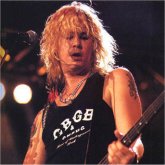
The youngest of eight children, Duff McKagan was
born in Seattle,
WA, in the spring of 1964. His real name is Michael, but his family gave him
the nickname Duff at the age of two and it stuck. He grew up rebellious, falling in love with punk and glam rock by the time
he was a teenager. His brother, Bruce, introduced him to the bass, but he did not take to the instrument right away. At the
tender age of 16, the Fastbacks hired him on as their drummer, giving him his first shot in the developing Seattle rock scene. He left the band toward the end of 1981 and began playing in countless
other punk combos in the area. Most influential was his work with the Fartz, a band that never made it that far but served
as one of the primary influences on grunge innovator, Mudhoney. While McKagan enjoyed the gigs he was working, he tried his
luck in Los Angeles after a few years of playing in the Northwest.
Upon moving to the town, he met future Guns N' Roses founders Slash and Steven Adler, and decided to form a trio with the
others called Road Crew. The band gave them the kind of visibility they craved, but upon meeting Indiana transplants Izzy
Stradlin and Axl Rose, the five flirted with the idea of combining their forces, until finally Guns N' Roses became a reality
in 1985.
After a self-released EP gained them more attention in the Los Angeles
area, Geffen Records signed them for an album in 1986. The result, Appetite for Destruction, would be one of the most important
rock records ever released, although it would be hard to tell from the initial impact. The album floundered at first, McKagan
even considered going back to Seattle, until "Welcome to the
Jungle" became a runaway hit. The band instantly became a huge sensation, and the media ate up their bad boy reputation and
incredible live performances. The whole band let fame get to them, but no member took it as seriously as Axl Rose, who began
to shake up the band with his increasingly controversial statements to the media and erratic behavior. Things became serious
during the release of the Lies EP, which featured a racist rant in the song "One in a Million" that McKagan and Slash both
spoke out against in the press. Rose slowly continued to dominate the band, driving out Adler and Stradlin and replacing them
with less vocal contributors Matt Sorum and Gilby Clarke. Ironically, McKagan and Slash bonded with these two members strongly,
making the distance between Rose and the other members only larger. When the band hit the road for the endless Use Your Illusion
tour, the backstage decadence and wild spending became ridiculous, as opening bands would report to the press about orgies
and pig roasts.
McKagan was disillusioned with the music he was making, and after contributing songs to Iggy Pop's
Brick by Brick, he tried his hand at a solo album. His drinking had gotten wildly out of control, and the resulting Believe
in Me was a disjointed and awkward effort that failed to spark the public's interest. When the tour ended, McKagan discovered
that his pancreas was in such terrible shape that he had to immediately give up drinking or face almost-certain death. After
a cover of the Rolling Stones' "Sympathy for the Devil," the band separated to take time away from one another. Thinking that
Guns N' Roses was just taking a break, McKagan started working with Slash on the Slash's Snakepit project along with the other
members of Guns N' Roses, except for Rose. Sessions for a new Guns N' Roses album continually fell apart, and McKagan started
working with the Neurotic Outsiders and several solo projects from fellow- and former-Guns N' Roses members. As the years
began to tick away, Rose finally sent news to the remaining members of the band that they had to stop working on other projects
or they were going to be fired. That was the final straw for McKagan, as he separated from the band and joined Seattle punk rockers Ten Minute Warning, a band he had played in almost 15 years before.
Since that point, McKagan has continued to release solo projects, perform with his fellow Guns N' Roses outcasts,
and was married for the third time. He even had his first child in 1999, and managed to get acting jobs on television. He
ran a marathon in 2001, right before reuniting with Izzy Stradlin for a tour of Japan. The likelihood of the original Guns
N' Roses reuniting looks slimmer every year, but even his brief time with that band will forever give McKagan the notoriety
that has made him one of the most recognizable bassists in rock music.
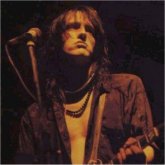
As the lead guitarist for Guns N' Roses, Slash
established himself as one of hard rock's finest and most soulful soloists during the late '80s, technically adept yet always
firmly grounded in the gritty Aerosmith and Stones' licks he loved. Slash was born Saul Hudson on July 23, 1965 in Stoke-on-Trent,
England, to artistic parents both involved in the entertainment industry; his mother was a clothing designer who worked on
David Bowie's film The Man Who Fell to Earth, and his father designed album art for such artists as Neil Young and Joni Mitchell.
The family eventually moved to Hollywood, where Hudson attended junior
high, received his first guitar, and met future GN'R drummer Steven Adler. With Hudson adopting the nickname Slash, given
to him by a family friend, the two formed a band called Road Crew; although it proved unsuccessful, it was the vehicle through
which they met and eventually joined up with the other members of Guns N' Roses. The Gunners debuted in June 1985, and even
before Appetite for Destruction was released in 1987, the band acquired a reputation as notorious alcohol and drug abusers.
As their popularity soared, the reserved Slash established himself as an important part of the band's visual image, with a
top hat and a mound of shaggy black hair covering his face as he typically staggered around the stage with a cigarette dangling
from his mouth.
Hedonistic excess consumed most of the band, with such incidents as Slash and Duff McKagan's drunken,
profane acceptance of the band's American Music Award on live television. In 1990, opening for the Rolling Stones, Axl Rose's
infamous on-stage pronouncement that he would leave the band if certain members did not stop "dancing with Mr. Brownstone"
(using heroin) was primarily directed at Slash and Adler; Slash kicked his habit within a year, but Adler did not and was
fired. In 1992, Slash courted controversy again with a product endorsement for Black Death vodka. Later that year, he was
married to actress and model Renee Sorum, a union that lasted five years.
Meanwhile, in spite of controversy and personnel
turnovers, Guns N' Roses had actually continued to record music. After the Use Your Illusion sets of 1991, and the 1993 punk
covers album The Spaghetti Incident?, the band went on hiatus. Slash formed a side project called Slash's Snakepit, which
consisted of fellow Gunners Matt Sorum (drums) and Gilby Clarke (guitar), plus bassist Mike Inez and vocalist Eric Dover.
The group released an album in 1995 titled It's Five O'Clock Somewhere; Slash hit the road with a slightly different touring
lineup, with Brian Tichy and James LoMenzo signing on as the rhythm section. In 1996, Slash put together a different band
to play at a blues festival in Budapest, an endeavor that
evolved into Slash's Blues Ball. Featuring vocalist/harmonica player Teddy Andreadis, rhythm guitarist Bobby Schneck, saxophonist
Dave McClarem, bassist Johnny Griparic, and drummer Alvino Bennet, Slash's Blues Ball devoted themselves primarily to a repertoire
of classic blues covers, plus occasional GN'R and Snakepit material. Rumors about the status of Guns N' Roses had been swirling
for some time, and in October 1996 it was confirmed that, owing to his unwillingness to follow Axl Rose's interest in industrial
and electronic music, Slash was no longer a member of the band (although he left the door open for a reunion if Rose decided
to return to guitar-based rock & roll). He gigged off and on with the Blues Ball into 1998, although a rumored live album
never materialized. Instead, Slash decided to re-form the Snakepit in 1999 with an entirely different lineup (the original
members were by this time involved in other projects, and the Blues Ball was more suited to touring than developing original
material). Raspy-voiced singer Rod Jackson and ex-Venice drummer Matt Laug came on board, along with Blues Ball bassist Griparic
(now Johnny Blackout) and Teddy Andreadis, who contributed keyboard and harmonica work. After trying out ex-Alice Cooper guitarist
Ryan Roxie, Slash settled on rhythm guitarist Kerry Kelly, who had previously worked with Warrant and Ratt. The new Snakepit
played some gigs together and in the spring of 2000 completed a new album, which was originally slated to be released on Interscope/Geffen.
However, feeling that a more traditional guitar rock album would get lost in the promotional shuffle, Slash moved over to
Koch, which finally released Ain't Life Grand in October 2000.
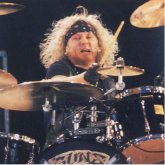
Matt Sorum was born on November 19, 1960 in Long
Beach, California.
His lifelong passion for drumming was ignited by seeing the Beatles' Ringo Starr perform on television. While interested in
many types of music, his older brothers helped introduce him to 70s rock bands like Led Zepplin, Queen, and Black Sabbath
that would later influence his playing style. By his teens, Matt was already playing in bands with friends. While at Mission Viejo high school, Matt absorbed all the musical education that he could, including participating
in the school marching band and jazz ensemble. After completing high school, Matt decided to move to Los Angeles and pursue a career as a professional drummer.
Over ten years of hard work honing and expanding
his skills followed that decision. Matt played in many bands covering the entire musical spectrum, including many rock, country,
pop and jazz bands. He also began doing studio work with various pop artists. After some time working in Gladys Knight's touring
band, Matt decided to concentrate on rock drumming. More years of working in various bands and studio work followed. Matt
played on a number of albums, including Tori Amos' unsuccessful debut album, Y Kant Tori Read. Offers to work with other groups and producers became more frequent as his reputation as a live performer
and studio artist grew.
All his hard work and dedication finally began
to pay off for him in 1988, when he was called to audition for The Cult. Matt won the spot behind the drums on The Cult's
tour to support their highly successful album, Sonic Temple. Matt spent the next year touring with The Cult, and attracted the attention
of many people, including Slash and Duff McKagan of Guns n Roses, the most popular and successful band in the country at that
time. Impressed with his playing, Slash and Duff invited him to audition for GnR to replace their recently fired drummer Steven
Adler. Matt got the job, and began to work with GnR on their next album once his commitment to The Cult was complete. Matt
worked with Guns n Roses on their multi-million selling double albums, Use Your Illusion 1&2, as well as the 2.5 year long tour to support those albums. Working with GnR exposed Matt to an even
broader audience than before, and gained him many new fans worldwide. He was able to bring a new level of skill to GnR's drumming,
which helped the band improve their playing as well. After releasing the cover album The Spaghetti Incident, GnR slowly ground to a halt creatively. While waiting for GnR to get together, Matt had some time to
work on the first Slash's Snakepit album, It’s Five O'Clock Somewhere, and the solo albums of both Duff and Gilby Clarke.
The opportunity soon came up for Matt to form
his own band. In 1995, Matt was asked to put together a band for a benefit show. He called Duff, who in turn called in Steve
Jones (of The Sex Pistols) and John Taylor (of Duran Duran) for the show. The instant chemistry between the band members led
to the forming of a band,Neurotic Outsiders , that wound up playing regularly at the famous Los Angeles club, The Viper Room. The band quickly became popular, with hundreds of fans
being turned away from each show. Many famous friends of the band joined them onstage, including punk icon Iggy Pop, retro
band leader Brian Setzer, Slash, Izzy Stradlin, The Cult’s Ian Astbury, and Duran Duran’s Simon LeBon, among others.
Record company interest soon followed, and the band signed a deal with Madonna’s label, Maverick Records. An album and
short tour followed in 1996, but commitments to their other bands led to the group’s dissolution. Frustrated by the
endless recording sessions and lack of progress on a new GnR album, Matt quit GnR in 1997.
After leaving GnR, Matt began to branch out as
a musician. He formed a production company with his friend, Lanny Cordola, and they have produced a number of artists and
movie soundtracks together. In 1998, he released the instructional videotape, Drum
Licks and Tricks from the Rock n Roll Jungle, to demonstrate his techniques. A brief reunion of Neurotic Outsiders
happened in 1999, and brought The Cult’s Billy Duffy and Ian Astbury onstage together for the first time since The Cult’s
hiatus in 1995. Encouraged by the strong response, Billy and Ian decided to reform The Cult. Matt jumped at the chance to
work with them again, and a sold out club tour followed that summer. The band signed a record deal with Lava/Atlantic, and
released an album,Beyond Good and Evil, in June 2001. The band spent most of 2001 touring in support of the album.
Matt's solo album, Hollywood Zen, was released in 2003. Matt is currently
working with Slash and Duff from GnR and Scott Weiland from Stone
Temple Pilots in Velvet Revolver. Their debut album, Contraband, was released in 2004.
|
 |
|
|
|
|
 |
 |
 |
|
The Worlds Most Dangerous Site!!!
|
|

